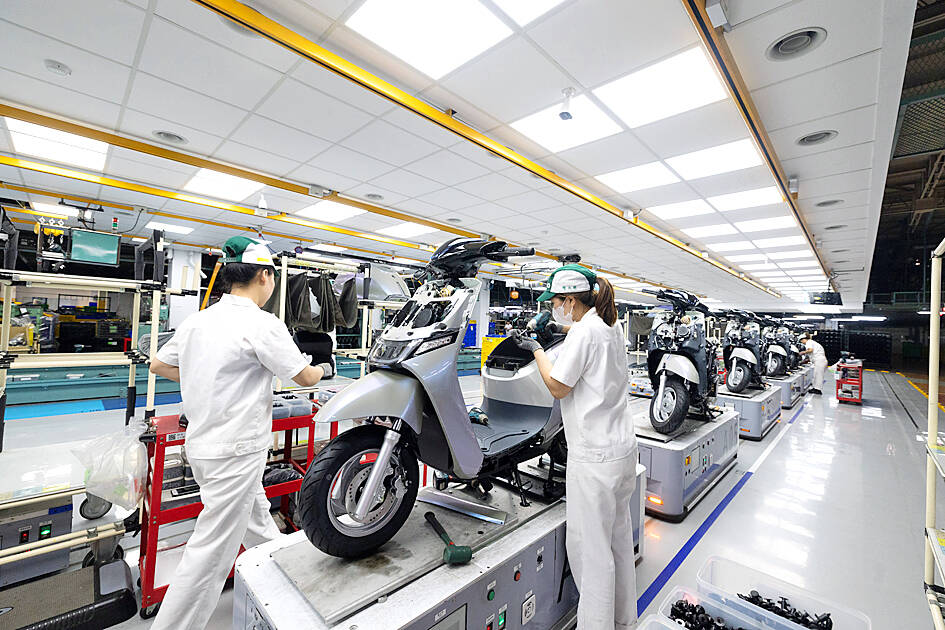Taiwan’s official manufacturing purchasing managers’ index (PMI) last month rose to 55.4, rebounding to expansion mode for the first time in 14 months, as firms rebuild inventory amid subdued uncertainty, the Chung-Hua Institution for Economic Research (CIER, 中華經濟研究院) said yesterday.
“The manufacturing industry reported business improvement in May, although uneven growth persisted,” CIER acting chairman Wang Jiann-chyuan (王健全) told a news conference in Taipei.
PMI data aim to gauge the health of the manufacturing industry, with values of 50 and higher suggesting expansion and scores lower than the neutral threshold suggesting a contraction.

Photo: CNA
It is the first expansion since May 2022 when Taiwanese manufacturers took a hit from a global slowdown induced by drastic inflation and monetary tightening.
The recovery came after the US and China put up decent economic showings with no new geopolitical tensions, Wang said.
That explained why the critical measures of new business orders and industrial output gained 13.7 and 10.9 points to 63.8 and 61 respectively, the monthly survey showed.
However, rush and short orders lingered, reflecting a conservative attitude among customers at home and abroad, Wang said.
Suppliers of electronics used in artificial intelligence products fared noticeably better than peers in other tech sectors, he said, adding that tech firms in general recover faster than non-tech companies, which remained weighed by weak demand and sharp competition.
The readings on inventory rose 2.1 points to 49.2, while customers’ inventory shed 1.8 points to 42.1, as they remained cautious, Wang said.
Sticky inflation in the US and the US Federal Reserve’s evasive stance on rate cuts lent support to that wariness, although firms grew more positive about their business prospects in the following months, the institute said.
The subindex on the six-month outlook rose 4.9 points to 60.1, its highest since April 2022, it said.
At the same time, the reading on raw material prices increased 2 points to 66.1, meaning that firms increasingly felt the pinch of price pressures.
The S&P Global Taiwan Manufacturing PMI, which was 50.9, arrived at a similar observation, finding that some manufacturers sought to protect their margin through a rise in output charges for the first time in five months.
The data on delivery time confirmed a recovery at 52.5, from 50.3 in April, as shipping container shortages and port congestions resurged due to conflict in the Red Sea, CIER said.
In related developments, nonmanufacturing companies also reported business improvements on the back of Mother’s Day celebrations, Wang said.
The nonmanufacturing index rose 0.1 points to 54.2, as service providers from almost all sectors registered positive cyclical movements, he said.
Nonmanufacturers reported positive views about their business, as evidenced by the six-month outlook, which rose 8.7 points to 63.6, the Taipei-based think tank said.
All sectors shared the optimism, thanks to the arrival of the high season for hospitality operators and TAIEX rallies that benefit financial service providers, it said.

Real estate agent and property developer JSL Construction & Development Co (愛山林) led the average compensation rankings among companies listed on the Taiwan Stock Exchange (TWSE) last year, while contract chipmaker Taiwan Semiconductor Manufacturing Co (TSMC, 台積電) finished 14th. JSL Construction paid its employees total average compensation of NT$4.78 million (US$159,701), down 13.5 percent from a year earlier, but still ahead of the most profitable listed tech giants, including TSMC, TWSE data showed. Last year, the average compensation (which includes salary, overtime, bonuses and allowances) paid by TSMC rose 21.6 percent to reach about NT$3.33 million, lifting its ranking by 10 notches

Popular vape brands such as Geek Bar might get more expensive in the US — if you can find them at all. Shipments of vapes from China to the US ground to a near halt last month from a year ago, official data showed, hit by US President Donald Trump’s tariffs and a crackdown on unauthorized e-cigarettes in the world’s biggest market for smoking alternatives. That includes Geek Bar, a brand of flavored vapes that is not authorized to sell in the US, but which had been widely available due to porous import controls. One retailer, who asked not to be named, because

CHIP DUTIES: TSMC said it voiced its concerns to Washington about tariffs, telling the US commerce department that it wants ‘fair treatment’ to protect its competitiveness Taiwan Semiconductor Manufacturing Co (TSMC, 台積電) yesterday reiterated robust business prospects for this year as strong artificial intelligence (AI) chip demand from Nvidia Corp and other customers would absorb the impacts of US tariffs. “The impact of tariffs would be indirect, as the custom tax is the importers’ responsibility, not the exporters,” TSMC chairman and chief executive officer C.C. Wei (魏哲家) said at the chipmaker’s annual shareholders’ meeting in Hsinchu City. TSMC’s business could be affected if people become reluctant to buy electronics due to inflated prices, Wei said. In addition, the chipmaker has voiced its concern to the US Department of Commerce

STILL LOADED: Last year’s richest person, Quanta Computer Inc chairman Barry Lam, dropped to second place despite an 8 percent increase in his wealth to US$12.6 billion Staff writer, with CNA Daniel Tsai (蔡明忠) and Richard Tsai (蔡明興), the brothers who run Fubon Group (富邦集團), topped the Forbes list of Taiwan’s 50 richest people this year, released on Wednesday in New York. The magazine said that a stronger New Taiwan dollar pushed the combined wealth of Taiwan’s 50 richest people up 13 percent, from US$174 billion to US$197 billion, with 36 of the people on the list seeing their wealth increase. That came as Taiwan’s economy grew 4.6 percent last year, its fastest pace in three years, driven by the strong performance of the semiconductor industry, the magazine said. The Tsai